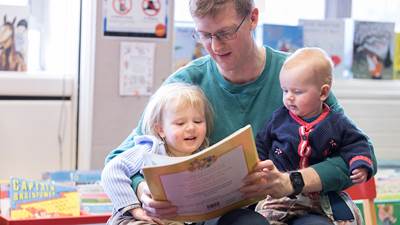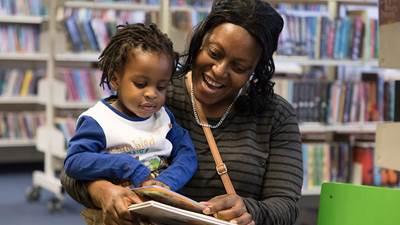 Reading together, changing children's lives
Reading together, changing children's lives
We want to talk about how reading, and reading together in particular, can transform outcomes for children.
Reading Together, Changing Children's Lives is our new action plan based on decades of experience of working with millions of families and thousands of local partners, including health visitors, nurseries, schools, libraries and food banks.
It shares what we think needs to be done to support families to become regular reading families in the early stages of a child's life. And we've joined forces with all 12 Waterstones Children's Laureates to call on the government to invest in reading for the under-sevens. Our four proposals are:
- Embedding reading in the life of every low-income family
- Using shared reading to bring enjoyment and stability to vulnerable children
- Helping antenatal and early years practitioners promote shared family reading
- Supporting primary school teachers to cultivate a love of reading
Our open letter with the Children's Laureates
Read it here
We've joined forces with all 12 Waterstones Children's Laureates to write an open letter to Rishi Sunak and the Leader of the Opposition calling for investment in reading for the under-sevens - read it here.
Why I'm supporting Reading Together
"Let's do it for our children"
Sir Michael Morpurgo - BookTrust's President and former Waterstones Children's Laureate - shares why he's supporting our Reading Together campaign.
The Reading Together booklet
-
BookTrust: Reading Together summary
Download BookTrust's Reading Together summary.
-
Reading Together, Changing Children's Lives
Download BookTrust's Reading Together paper.
What is special about shared reading?
Whilst reading in general has an impact on outcomes, three important ingredients which are specific to shared reading stand out from our research. When adults share picture books with babies and children there are both immediate and longer-term benefits:
- Physical closeness and shared attention: Sharing unhurried reading time is a perfect space for bonding and attachment. Sharing a point of interest with an adult teaches concentration, decoding and sensemaking.
- Enjoyment: When a child sees an adult getting involved and enjoying a story, they enjoy it too.
- Interaction: Interactive reading helps relationships form and supports children's language and cognitive development, yielding benefits from as early as two weeks. An adult reading in this way involves the child as much as possible, letting a child grab and touch a book; and paying attention to the child's responses and reactions.
Proposal 1: Embedding reading in the life of every low-income family
In childhood, shared reading has immediate benefits - it supports bonding between children and their parents, stimulates brain development and improves sleep. It also helps children reach early development goals and leads to longer-term outcomes.
But while 95% of families know it's important to read with their child, only 42% of children share a bedtime story. That's why BookTrust has developed Bookstart Baby, Toddler (1-2 years) and Pre-schooler (3-4 years) to provide books and resources in ways that we know will motivate and support families on low incomes to read regularly.
We reach half a million families with new babies each year and over 400,000 low-income families with toddlers. 98% of families find our resources exciting and enjoyable and 84% of low income families say they prompted them to read more with their child – but our funding allows us to reach fewer than 40% of eligible low-income families.
Our tested programmes should be available to all low-income children and families, both in areas of high poverty and in pockets of deprivation.
Proposal 2: Using shared reading to bring enjoyment and stability to vulnerable children
Early shared reading matters for all children - it supports attachment and can help make children feel secure and loved. When babies and children experience disruption or difficulties at home, it can be especially transformative.
Children from vulnerable family backgrounds, or those who move from one home to another, face particular challenges in establishing regular shared reading - they may have limited access to engaging and appropriate books, complex and busy lives and circumstances that make regular routines and rituals difficult. That's why we run our Letterbox Club, which supports thousands of children in long-term foster care with specially chosen books and resources.
Our intensive shared-reading programmes should be available to thousands more children from vulnerable family backgrounds, providing evidence-based and sustained support so they can read regularly with their families.
Proposal 3: Helping antenatal and early years practitioners promote shared family reading
Families interact with a wide range of practitioners in the early stages of their child's life, including midwives, health visitors, nursery staff, childminders and early years staff in schools. These interactions all represent an opportunity. When early years practitioners encourage parents to share stories and show them how to do it, parents and are more motivated and confident.
That's why our early years programmes include support for thousands of practitioners. For example, 83% of librarians in more than 2,000 public libraries liked or loved working with us on BookTrust Storytime.
We want our support, guidance, tools and training in shared reading to be available to all early years practitioners, helping children reach their early development goals, particularly in areas where there are high numbers of children from low-income families.
Proposal 4: Supporting primary school teachers to cultivate a love of reading
Exposure to a story-rich environment boosts children's speaking and listening skills, knowledge of the world and social development, as well as significantly impacting on their capacity to learn to read.
But shared reading drops sharply when children start school. 53% of parents and carers of primary-age children say reading is not a big part of family life, with many saying that practising phonics takes precedence over reading for enjoyment. Children's enjoyment of reading declines through childhood and is in overall decline.
BookTrust has a strong evidence base for how to build positive reading behaviours in children. We want to see shared reading as a central part of every school curriculum and every family's life.
Our research, guidance and book recommendations should be part of every teacher's toolkit - so children discover a range of high quality, relevant, inspiring and representative books.




